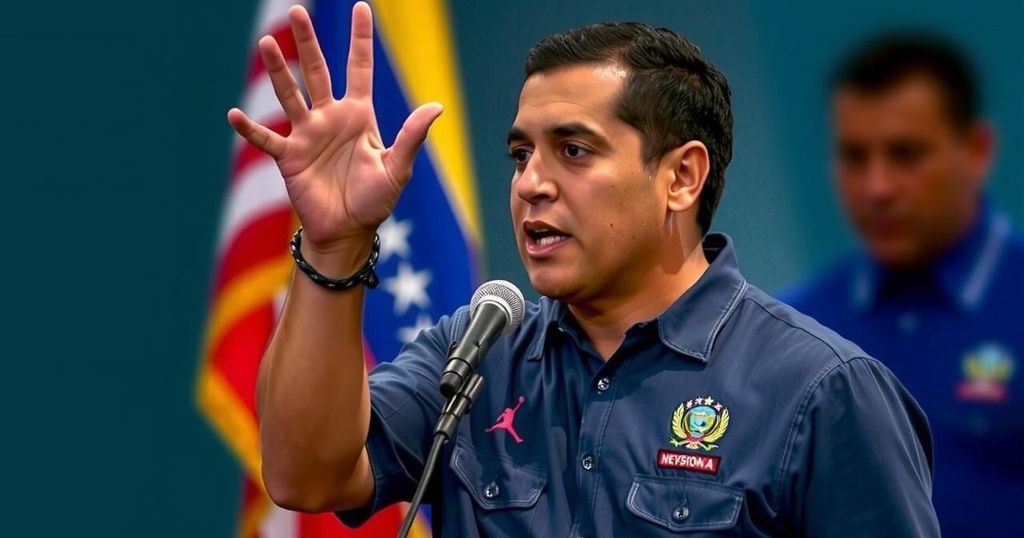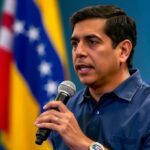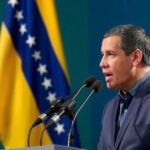Elections
Politics
ANTONY BLINKEN, BLINKEN, BRAZIL, CARTER CENTER, COLOMBIA, CUBA, DEMOCRACY, ELECTION, EUROPEAN UNION, GIL, GONZALEZ, NATIONAL ELECTORAL COUNCIL, NICOLAS MADURO, NORTH AMERICA, POLITICS, PRESIDENTIAL ELECTION 2024, SOUTH AMERICA, SUPREME TRIBUNAL OF JUSTICE, TRADE RELATIONS, UNITED NATIONS, VENEZUELA
Nia Simpson
U.S. Recognizes Edmundo Gonzalez as President-Elect of Venezuela Amid Controversy
The U.S. has recognized Edmundo Gonzalez as the “president-elect” of Venezuela after the disputed July election. Secretary of State Antony Blinken supported this stance, asserting that Gonzalez received more votes despite Maduro’s claims. Maduro’s administration faces international skepticism over election transparency. Gonzalez’s recent exile and accusations against U.S. officials underline the heightened political tensions as the country approaches its next presidential term.
On Tuesday, the U.S. government officially recognized Edmundo Gonzalez, a Venezuelan opposition candidate, as the “president-elect” of Venezuela, months after President Nicolas Maduro’s controversial victory in the July election. Secretary of State Antony Blinken’s endorsement of Gonzalez was accompanied by a call for respect for the Venezuelan electorate’s will. The Biden administration asserts that Gonzalez secured the most votes during the disputed election, although it has refrained from fully granting him presidential status. Immediately following the election, Venezuela’s National Electoral Council, composed largely of Maduro supporters, announced Maduro’s re-election without providing detailed vote statistics. In contrast, the opposition coalition reported that it had collected voting data from 80% of the electronic voting machines, suggesting that Gonzalez had received double the votes of Maduro. Following Blinken’s remarks, Gonzalez expressed gratitude for the recognition of the Venezuelan people’s choice, emphasizing their desire for change. After receiving an arrest warrant linked to the tally sheet controversy, Gonzalez fled to Spain in September. Venezuelan Foreign Minister Yvan Gil responded to Blinken with personal criticism, suggesting that the U.S. Secretary of State should reflect on the failures of his administration. Both Maduro and the electoral body have dismissed calls from various nations and organizations, including the U.S. and the EU, to reveal detailed voting evidence supporting Maduro’s re-election claims. The Supreme Tribunal of Justice, aligned with the ruling party, was asked to examine the election results and maintained Maduro’s victory despite international skepticism. International observers from the United Nations and the Carter Center found the electoral results lacking credibility. Meanwhile, Colombian President Gustavo Petro, who initially backed the elections, later deemed them a “mistake,” highlighting an erosion of support for Maduro. The situation remains critical as Venezuela prepares for its next presidential term on January 10, 2024.
The political landscape in Venezuela has been tumultuous, especially surrounding the presidential elections. The July 2023 election has been marred by accusations of electoral irregularities, raising concerns about Maduro’s legitimacy. The U.S.’s recognition of Gonzalez as president-elect signals a significant shift in international perception and support for Venezuelan opposition leaders. Furthermore, the ongoing investigations and the international community’s reaction indicate a continuing struggle for democratic reform within the country.
In conclusion, the U.S. government’s recognition of Edmundo Gonzalez as Venezuela’s president-elect signifies growing international support for the opposition and highlights the ongoing disputes regarding the legitimacy of the Maduro administration. The lack of transparency in the recent elections has incited widespread criticism, with many international leaders reevaluating their positions on Venezuela’s electoral processes. As the nation approaches the inauguration of its next presidential term, the political climate remains fraught with tension and calls for change.
Original Source: www.voanews.com








Post Comment